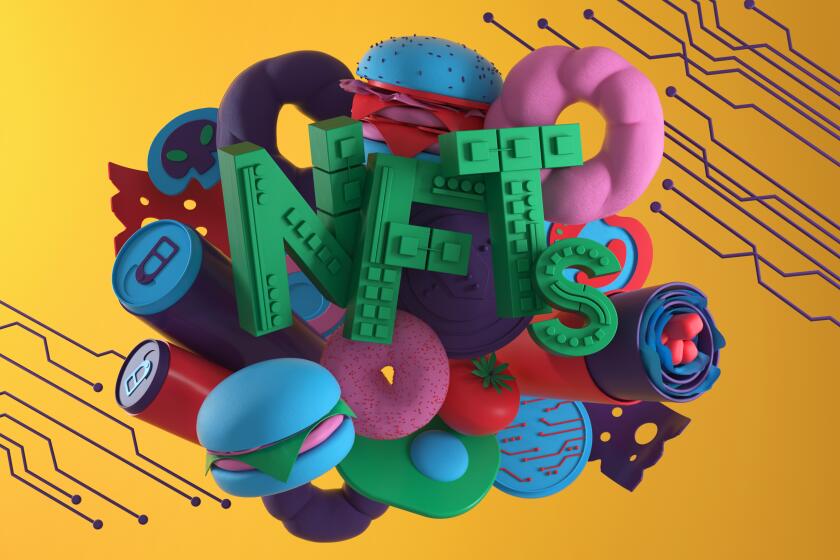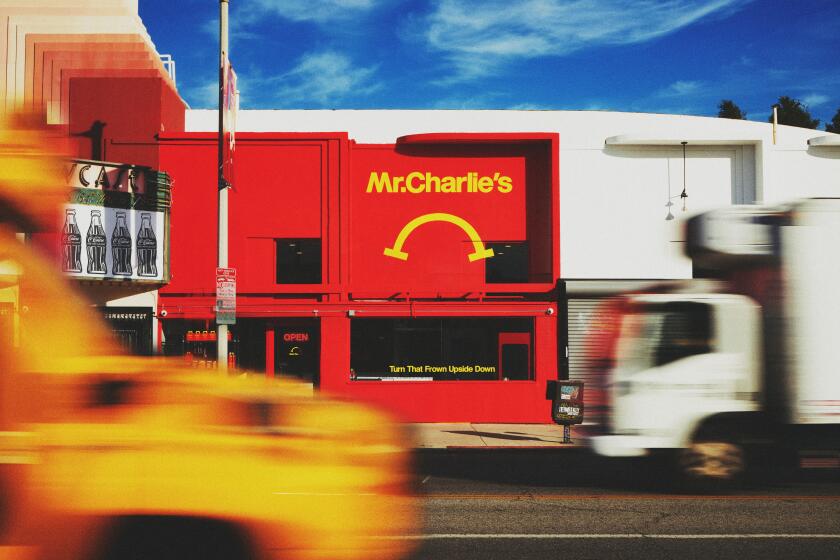Can NFTs save the restaurant industry or is the hype just virtual?
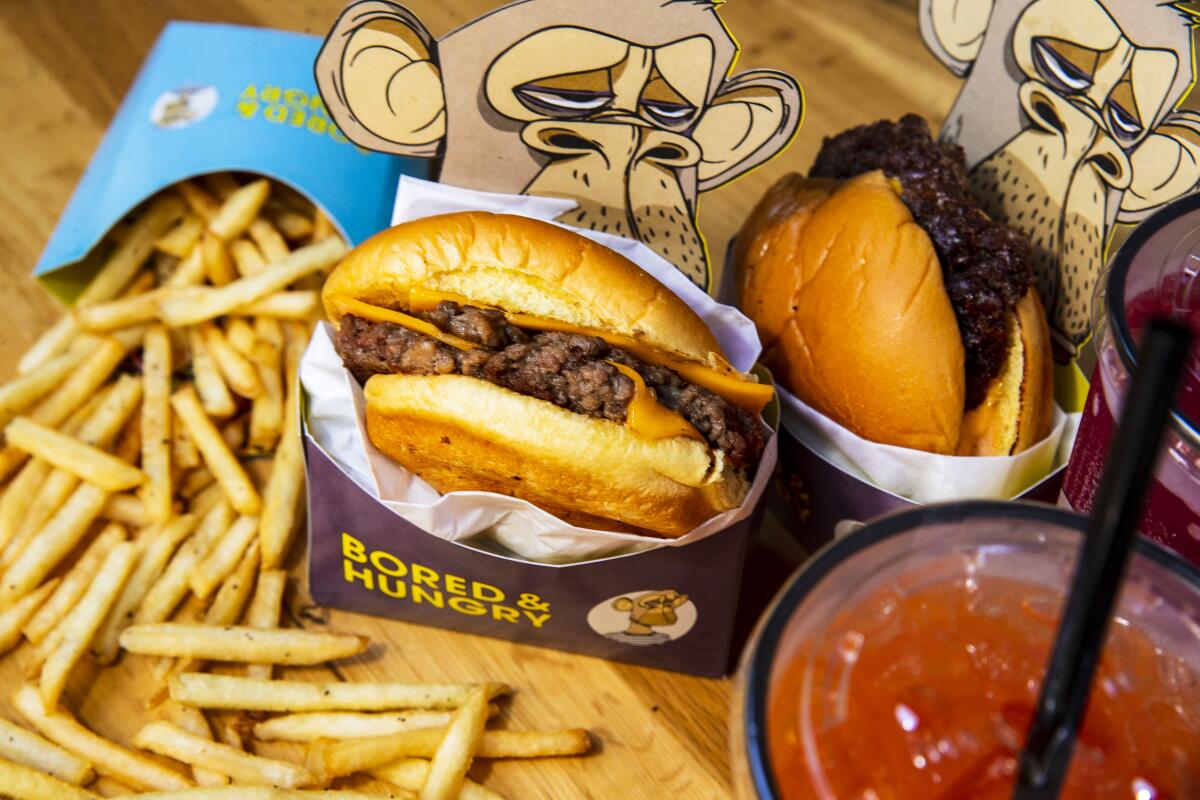
- Share via
On a bright afternoon outside the restaurant Bored & Hungry in Long Beach, the atmosphere is one of a low-rent Coachella. A laptop DJ plays thudding hip-hop music near a tent with plastic tables and folding chairs and a row of bright blue portable toilets. The sun is strong and there’s not enough water.
And there are a lot of people. They’re mostly young, mostly having a good time, and some are sporting flair from their non-fungible token, or NFT, of choice: Bored Apes, CyberKongz, Bears Deluxe. There are a dozen people running around that I would categorize as “content creators” — dudes with cameras on monopods or smartphones on gimbals, conducting on-camera interviews and filming everything they can. Out on the sidewalk, the smell of weed segues nauseatingly to that of grilled meat, then back to weed.
For the record:
6:47 p.m. April 26, 2022An earlier version of this story misspelled Allen Au’s first name.
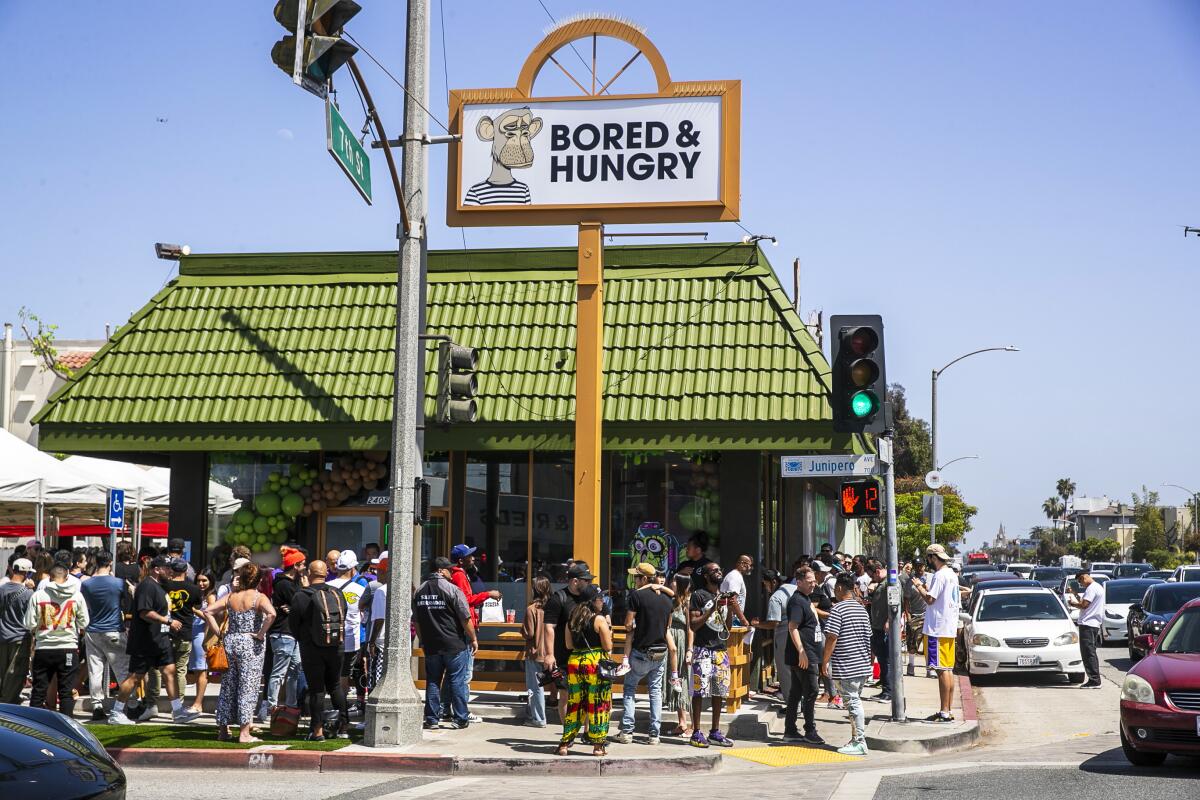
It’s the grand opening of restaurateur Andy Nguyen’s “world’s first Bored Ape-themed restaurant,” and the crown jewel of Food Fighters Universe, the “world’s first NFT-backed restaurant group.” Bored Apes are some of the most popular — and valuable — NFTs ever created. If you don’t know what an NFT is by now, imagine a screenshot-able jpeg. Now imagine holding a “certificate of authenticity” for the original — and selling it for millions of dollars.
I’ll admit to arriving to Bored & Hungry with a few preconceptions about NFTs. Namely, that they’re the Kardashians of the digital world. While Kim and family are famous for being famous, NFTs are valuable because they’re so expensive. But even if we’re in a speculative bubble, this opening felt important to witness, if only because it’s clear food and cyber-culture are becoming more intertwined: Ghost kitchens, essentially virtual restaurants, now litter the restaurant landscape due to the pandemic. Chefs like Tom Colicchio and Shirley Chung have their own NFT projects. Seemingly every celebrity alive has a crypto side hustle. (Yes, even the L.A. Times launched an NFT series.)
“We’re building a real-life experience,” said Nguyen, who has a Bored Ape and three Mutant Apes, a different kind of NFT created by the same company, Yuga Labs. “This is our gift to the Web3 community but we’re also showing the naysayers like, ‘Hey, we utilized IP, we turned it into a business.’”
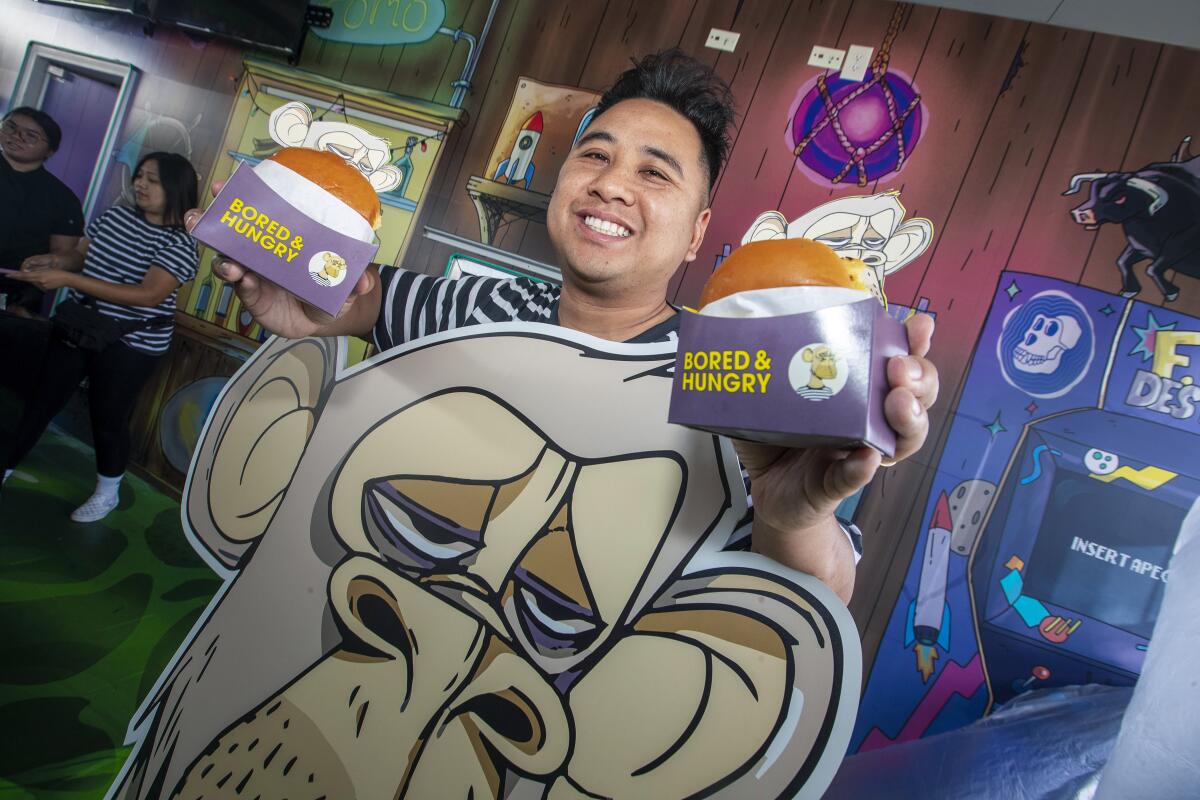
Launched in April last year, there are 10,000 of these cartoon ape profile pictures, randomly generated to have different accessories, like a Mr. Potato Head: Some have hats, some have cigarettes, some have 3-D glasses. They cost .08 Ethereum at launch, or about $220. Now the floor to purchase one is around $338,000, due in large part to celebrity influence. Justin Bieber and Post Malone own Bored Apes. In January, a glossy-eyed Jimmy Fallon conducted one of the more forced interviews in “The Tonight Show” history when he and Paris Hilton discussed their acquisitions of Bored Ape NFTs.
But while Bored Apes have “mooned” (shot up in price, in crypto parlance), NFTs can go down in value too, leading to comparisons to a virtual casino. Dozens of NFT and crypto projects have been accused of being cash grabs known as “rug pulls,” wherein developers quickly shut down a project after taking investor money.
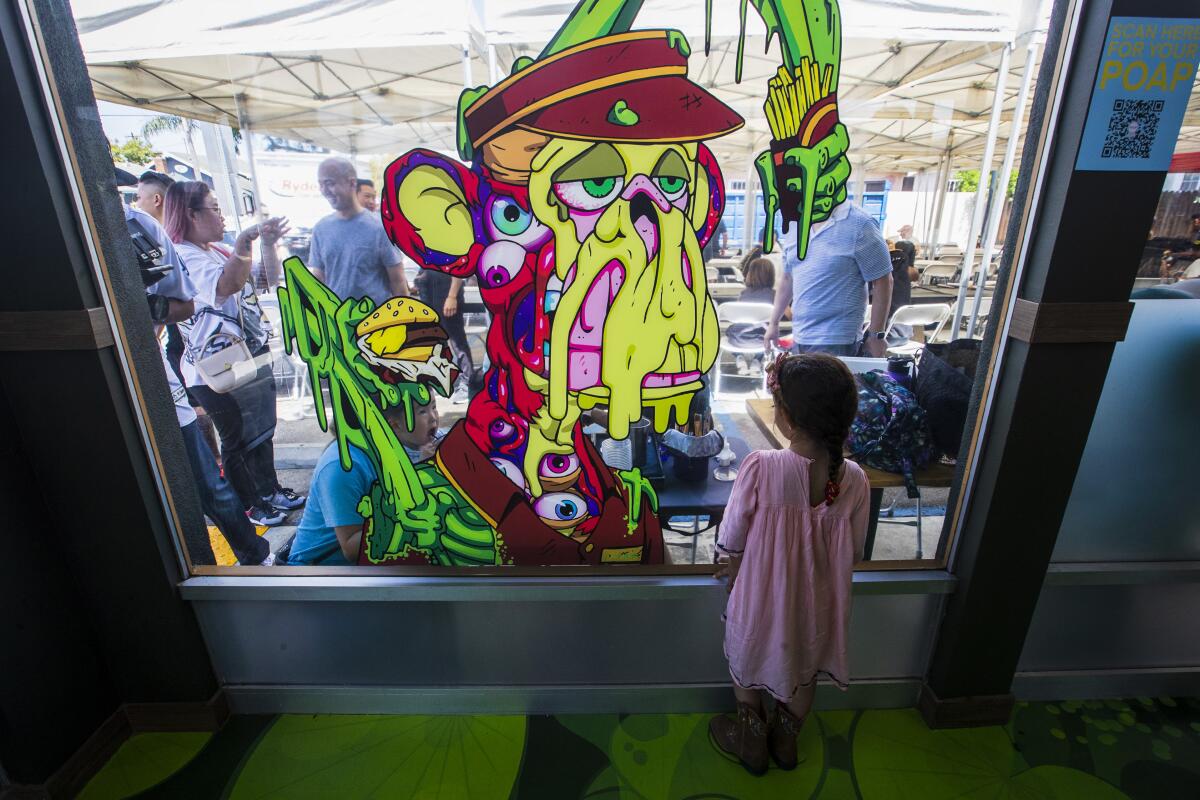
Sina Estavi, who purchased an NFT of Twitter founder Jack Dorsey’s first tweet, recently found out that his $2.9 million purchase is worth just a fraction of what he paid. CHFTY Pizzas, the NFT project backed by Colicchio, have not appreciated — in fact, they’ve gone slightly down in value since they launched.
Where does Bored & Hungry fit into all of this? While technically a restaurant — food is served to customers — the menu is as minimalist as In-N-Out’s. There are smashburgers, plant-based burgers, fries and sodas — that’s all. There’s no seating inside. It feels more like a kiosk at Disneyland than a restaurant, and like some paint has been quickly slapped onto the previous Louisiana Famous Fried Chicken. A couple of movie theater-style cutouts of Mutant Apes have been trotted out onto the floor for photo opportunities.
Big chain restaurants and local chefs are experimenting with NFTs and the metaverse to help market their brands.
But the burger is decent, and to serve smashburgers at Bored & Hungry feels like an appropriate choice — they’re a little overhyped (sorry), just like some NFTs. A few of the other advertised perks at the restaurant didn’t quite work according to plan: POAP (Proof of Attendance Protocol) badges, a type of NFT token, had run out by the time I tried to claim one. In theory, you can pay for your meal in cryptocurrency but according to a woman working behind the register, it’s a troublesome process and few people actually did it.
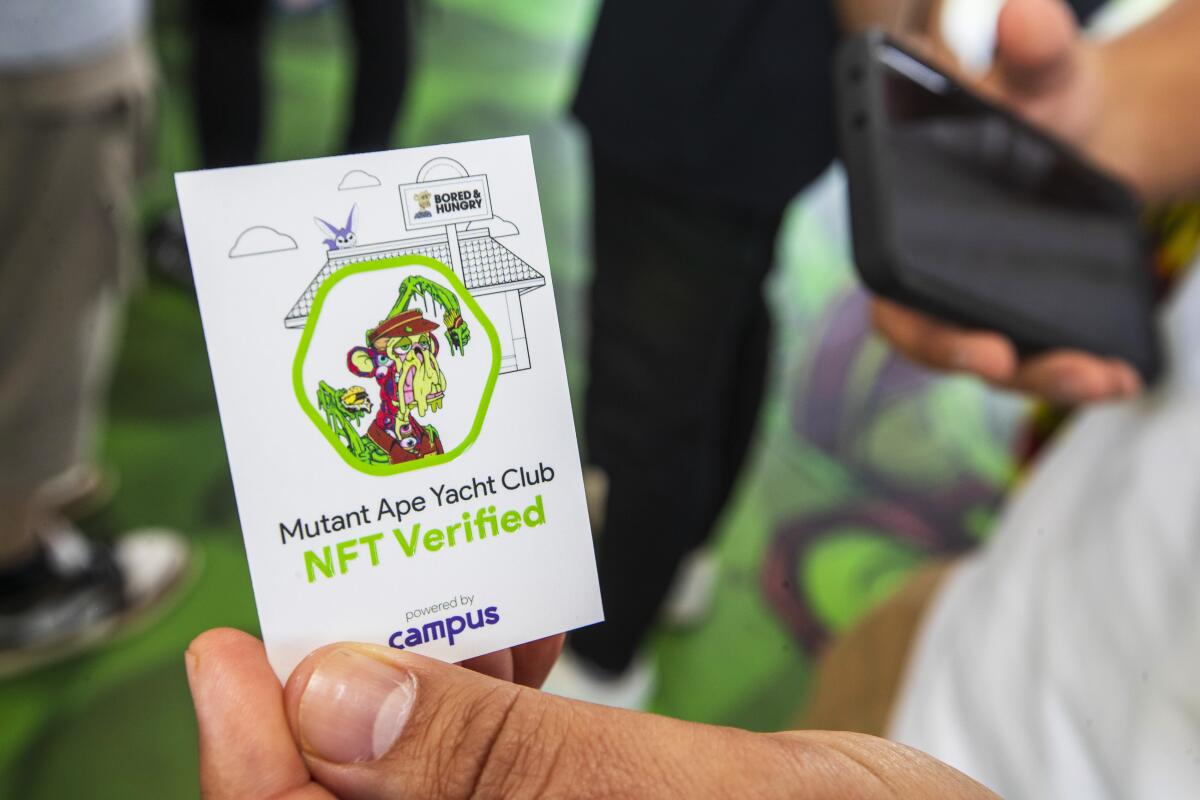
But the more I spoke to people waiting in line — waiting for several hours, in some cases — I had to admit: I was enjoying myself. And the people around me were having a good time too. It occurred to me that the actual restaurant aspect of Bored & Hungry was beside the point, much as the cartoonish, algorithm-based art of many NFT projects is. No one was really focused on food. It was just an excuse for fans to show support, no different than buying a Patreon, OnlyFans or Substack subscription.
“NFTs are a great way to make money off the brand that you created,” said Allen Au, who had been waiting in line for nearly three hours when we spoke. “You want to somehow engage with your community, with people who really follow you no matter what. Similar to if Taylor Swift dropped an album and 10,000 diehard fans signed up for it — it’s the same concept.”
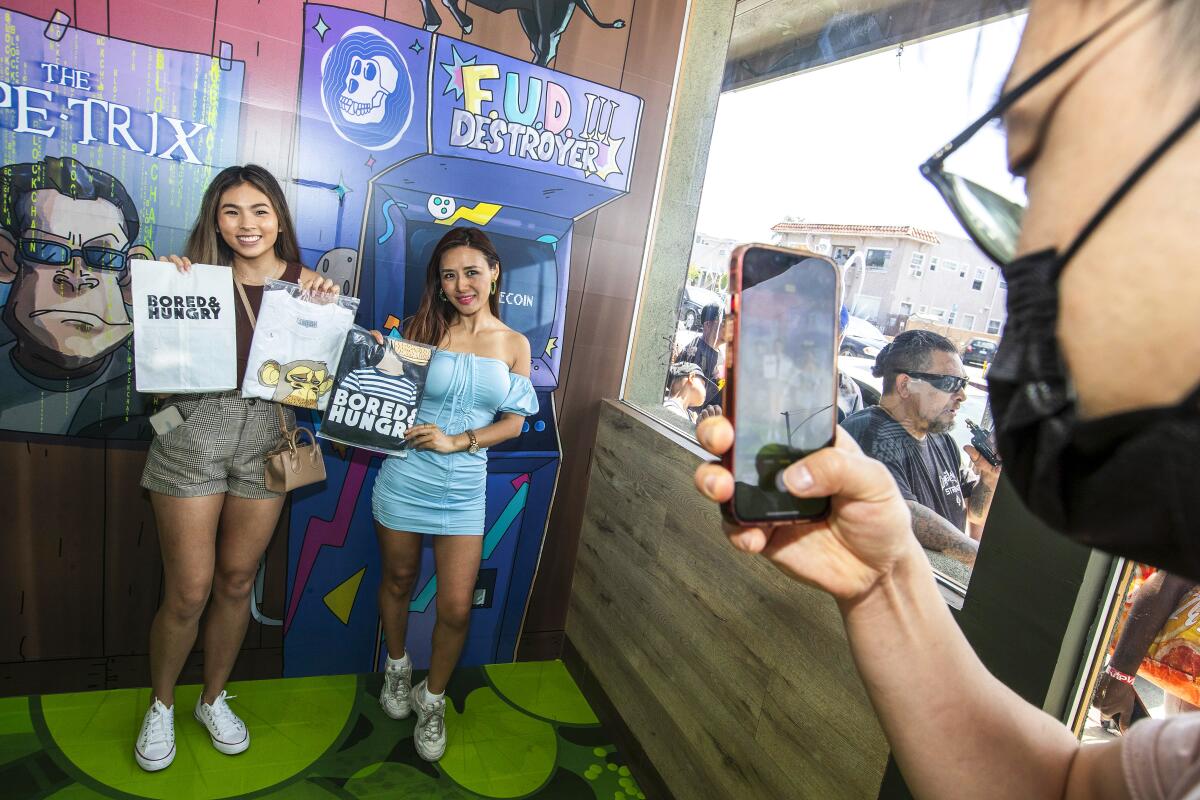
Dajae Williams, a musician and educator from Long Beach, said NFTs were a way for creators to keep track of their most enthusiastic supporters. “It’s a small community, so when you see somebody as hyped about it as you, it builds a bond,” she said.
And that enthusiasm can supersede any worry about the very real possibility of losing your entire investment. “I don’t really care anymore. I really enjoy the community,” said a 27-year-old cryptocurrency trader in socks and flip-flops who would only give his online name, Swed710 (I met several people who wanted to be known only by their online handles). “We like the same kind of stuff. Are you going to sell your Porsche if the Porsche market starts dying? No, you go out racing with your friends!”
But it’s not just about community — it’s clearly about money too. Swed said that he’d made around 100 Ethereum flipping Bears Deluxe NFTs. He said he even knew a 15-year-old that was making a killing in the space.
“He doesn’t have the usual expenses, so he can HODL,” said Swed, using a term commonly used in the crypto community meaning to retain your assets and not sell.
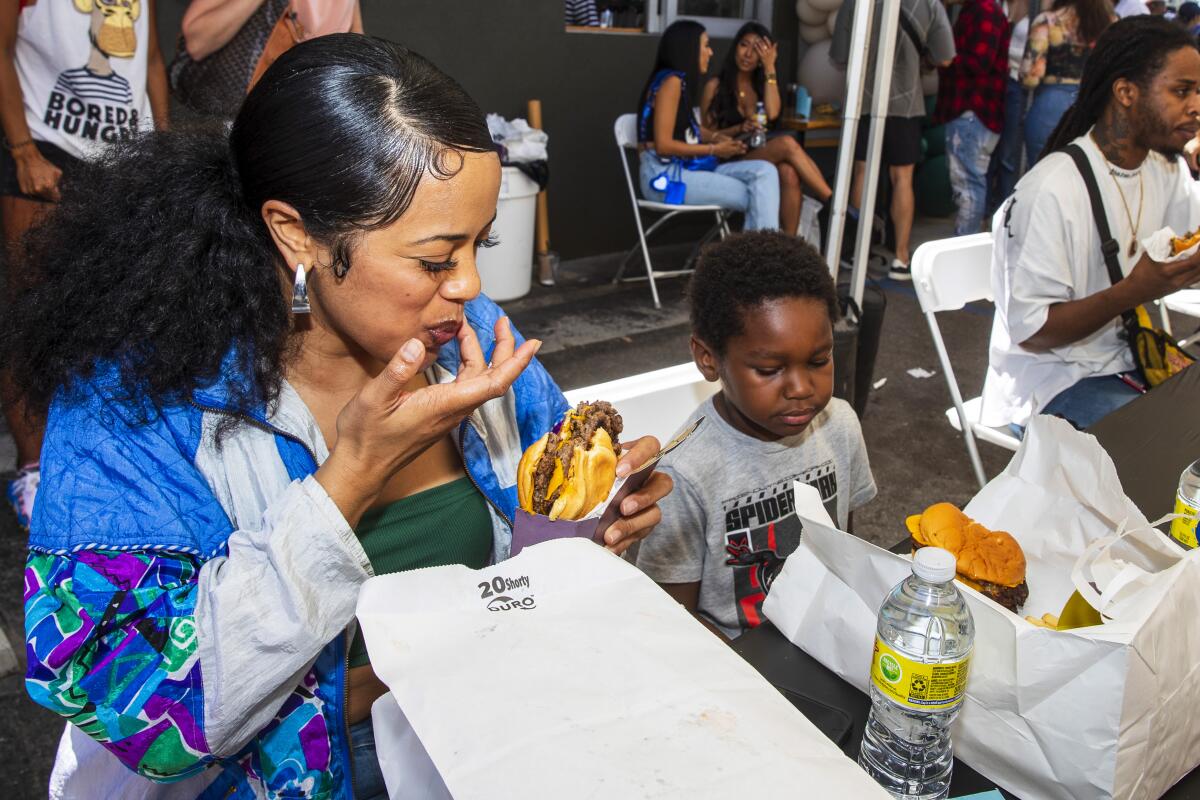
“If I didn’t make money off of it, I wouldn’t believe it,” said Gregory Brown, 35, a composer from L.A. who mines cryptocurrency and is interested in exploring the utility behind NFTs. “I put $100 in and then I make a quick $1,000? How is that possible?”
He acknowledged you can also lose everything. “Someone‘s losing — that’s the name of the game though,” he said.
NFTs, with the lure of potential easy money, are clearly a powerful marketing scheme. But is there utility beyond that? Nguyen thinks so, positing that NFTs can help “save the restaurant industry,” according to press materials.
I pressed Nguyen on exactly how he thinks NFTs “save the restaurant industry.” He said that restaurant owners can, by trading NFTs for profit, making enough money to address the food cost and labor issues that have plagued the industry.
Huh?
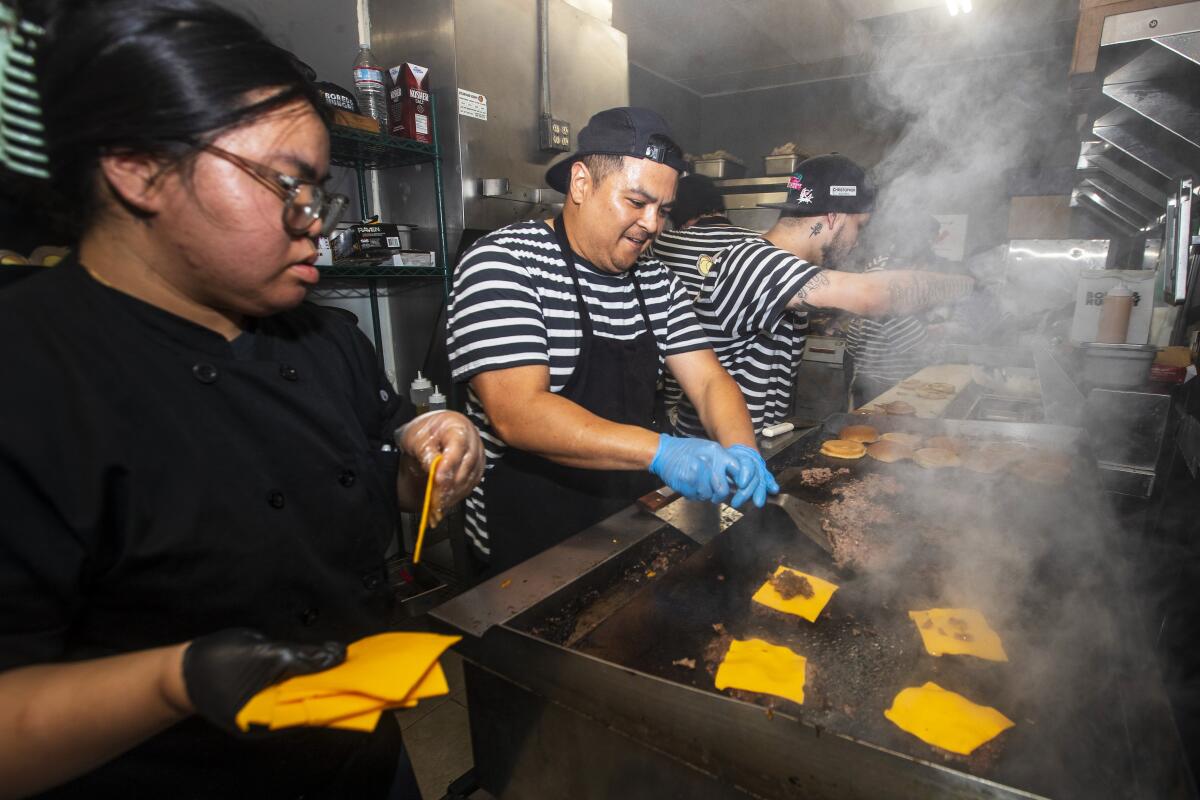
Nguyen pointed to fellow NFT entrepreneur Gary Vaynerchuk as an example; he created Flyfish Club, scheduled to open next year and marketed as the world’s first NFT restaurant. “He sold 3,000 memberships, and he raised about $14 million. So with $14 million to open a restaurant, you can pay your staff healthier wages,” Nguyen said.
That’s where Nguyen lost me. The future of the restaurant industry certainly cannot — and does not — rest on the ability to flip NFTs. Restaurateurs could just as easily put their seed money into a few penny stocks and hope for the best.
There’s a new plant-based restaurant in Los Angeles that many are calling the ‘vegan McDonald’s.’ Here’s the story behind the now-TikTok-famous restaurant.
I was more convinced by the musician damnboy!, or Edward Nguyen (no relation to Andy). Nguyen, who worked for years in restaurants in both front- and back-of-house roles, said that a restaurant’s NFT project could operate as something of a co-op: Letting employees have a stake in ownership and a say in the direction of a restaurant through purchase of an NFT.
“They can get a share of the company and still work for them and still get a paycheck,” said Nguyen. “Having a voice and a say is really cool.”
But if the value of the NFT project doesn’t go up? “There’s a risk working at any restaurant,” Nguyen said.
More to Read
Eat your way across L.A.
Get our weekly Tasting Notes newsletter for reviews, news and more.
You may occasionally receive promotional content from the Los Angeles Times.
